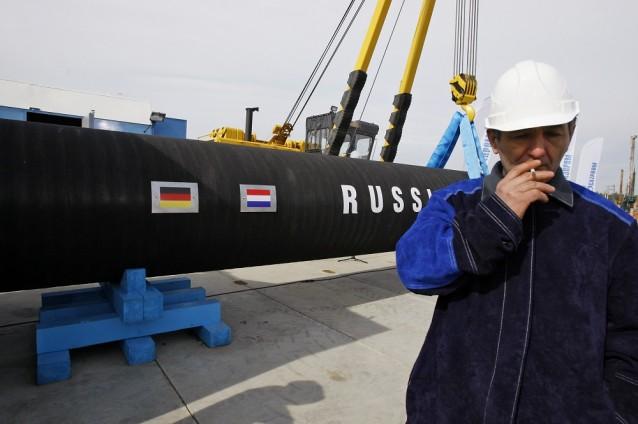
GAS: EFFECTIVE WEAPON

At face value, Russia's $400 billion deal to supply natural gas to China National Petroleum Corporation, via the state-controlled energy behemoth Gazprom, sounds like a coup for Moscow. But according to recent analysis, the deal is strongly tilted in China's favor. Gazprom will be lucky to break even on the contract and may even lose substantial amounts of money.
While the deal may not make economic sense for Gazprom, it does fit with Vladimir Putin's broader geopolitical "tilt to Asia" strategy, and represents "a desperate geopolitical gambit trumping all economic rationale," according to analysis by the Chatham House, a UK policy institute. In fact, the CNPC deal is just one example of how Gazprom operates more as an instrument of Putin's political ambitions and Russian state power than as a rational profit-maximizing corporation. While Gazprom trades on both Russian and American stock exchanges, it is majority-owned by the Russian government and takes its marching orders directly from the Kremlin.
Gazprom is first and foremost a tool of Russian foreign policy, which Putin is not shy about wielding to pursue Russian interests. During Putin's years in power, the Kremlin has used its control over Gazprom — increasing or decreasing the cost of energy — to maintain influence over Russia's neighbors. Putin once described Gazprom as "a powerful political and economic lever of influence over the rest of the world," and a team of Russian foreign policy experts noted that "if the leaders of this or that country decide to show good will towards the Russian Federation, then the situation with gas deliveries, pricing policy and former debts changes on a far more favorable note to the buyer."
Gazprom's behavior immediately before and after the overthrow of Ukraine's former President Victor Yanukovych is a clear example of this strategy. In December 2013, shortly after Yanukovych rejected a trade deal with the European Union, Gazprom rewarded him by unilaterally reducing the price of gas it charged Ukraine by one-third. As if to emphasize his power over Gazprom, Putin publicly announced this price reduction.
Three months later, however, after the Maidan revolution brought a pro-Western government to power in Kiev, Russia performed an about face, announcing an 81 percent increase in the price Gazprom charged Ukraine — a clear sign of the Kremlin's willingness to employ Gazprom as an economic and political weapon against the new government in Kiev.
Another sign of Moscow's use of the gas weapon against Ukraine occurred earlier this year when Gazprom began shipping gas directly to separatist territory after rebel forces damaged a pipeline. Even after Ukraine repaired these pipelines, Gazprom continued shipping gas directly to its separatist proxies while still billing Ukraine directly for these deliveries — a clear attempt by Moscow to use its energy power to intimidate Kiev by demonstrating Ukraine's weakness and dependence on Gazprom.
Ukraine is not the only neighboring country whose dealings with Gazprom are determined by its relationship with the Kremlin. A 2006 study from the Swedish Defense Research Agency found more than 50 instances when Russia used the energy lever to put political or economic pressure on its neighbors. While legitimate economic reasons frequently underpin Gazprom's coercive behavior, the Swedish study found that political motivation existed in more than half the cases it reviewed. In some of these situations the Kremlin's rhetoric is blatantly threatening. In 2013 the tiny former Soviet republic of Moldova began discussions with the European Union about a free trade deal, the same type of arrangement that precipitated the crisis in Ukraine. In response to those talks, Russia threatened to cut gas supplies to Moldova, with a Russian deputy foreign minister sarcastically warning the Moldovans that "we hope that you will not freeze."
Gazprom also plays a key role in supporting the Kremlin's power domestically. It functions as a de-facto social support agency, providing cheap domestic gas to Russian households and industry. This keeps the economy stable and Russian consumers — especially pensioners — warm in the winter and ensures that key domestic political constituencies continue to support Putin.
While the Russian government frequently promises Gazprom that it will be allowed to raise the price of domestic gas to a level sufficient to at least cover costs, Gazprom continues to lose large amounts of money on domestic sales. While a below-cost pricing strategy may be irrational by normal corporate standards, the Kremlin remains unwilling to risk the political and social instability that higher domestic gas could cause.
Finally, Putin uses Gazprom to maintain the loyalty of his closest political allies by allowing them to siphon off revenues from Gazprom — either through sweetheart contracts or outright corruption. A comparison between pipeline construction costs at similar projects inside and outside of Russia elucidates this role. According to one study, Gazprom spends twice as much money to build domestic pipelines than when it partners with foreign companies outside Russia. The study's author ascribes this discrepancy to the "wages of wickedness," and indeed, Gazprom loses almost as much money due to corruption and inefficiency as it makes in profits.
Gazprom's massive contract with CNPC is a case in point. Many of the construction projects associated with building the multibillion-dollar pipeline will reportedly go to entities controlled by Arkady Rotenberg and Gennady Timchenko, two members of Putin's inner circle, whose companies are the leading sub-contractors to Gazprom on the project. Gazprom's losses can be absorbed by the state through the government's National Prosperity Fund, while Kremlin insiders grab the profits.
The chairman of General Motors once said that "what is good for General Motors is good for America." The same could be said about Gazprom and Putin's Russia.
reuters.com
More:





